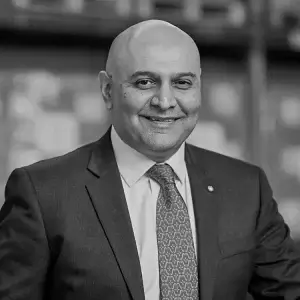 CSJ Board Member Dr Nik Kotecha OBE recently spoke at De Montfort University, where he served as Pro-Chancellor. See his speech below:
CSJ Board Member Dr Nik Kotecha OBE recently spoke at De Montfort University, where he served as Pro-Chancellor. See his speech below:
Having spent more than three decades in business, I’ve learned one lesson above all: change is constant. The pace of technological, economic, and social transformation today is unprecedented. But while change can be daunting, it also creates extraordinary opportunities – if we lead it rather than merely react to it.
Lessons from business
My own journey began in 1991, when I founded Morningside Pharmaceuticals from my garage in Leicestershire. I saw a clear need: developing countries lacked access to affordable, high-quality medicines, while counterfeit products were putting lives at risk.
In those early days I built the business through travel, personal networks, embassy contacts, fax machines, and the Yellow Pages. Then came the internet, which changed everything. Old systems were replaced almost overnight, and I faced a stark choice: adapt or be left behind.
We chose to pivot, moving into generic medicine development, clinical trials, and large-scale supply. Morningside grew into a major international exporter, working with UNICEF, the WHO, Médecins Sans Frontières, and the Red Cross. At home, we became a key NHS partner, delivering more than 300 medicines daily to hospitals and pharmacies, saving millions for the public purse.
Looking back, survival was never guaranteed. But by embracing disruption and acting decisively, we not only endured – we thrived. For me, the key has always been to lead change, not follow it.
The challenge facing young people
Today, I bring that same perspective to my voluntary work with The King’s Trust and the Centre for Social Justice (CSJ). Both organisations are dedicated to tackling the barriers that hold people back, especially the next generation.
The scale of the challenge is stark. Research published by the CSJ, found:
- 10 million working-age people in the UK are economically inactive.
- 3 million are out of work due to ill health or on sickness benefits.
- Almost 1 million young people aged 18–25 are not in education, employment, or training.
That’s one in seven young people whose futures are uncertain – many struggling with anxiety, poor mental health, or a lack of work-readiness skills. Unless we act, too many will drift away from the labour market entirely.
This comes at an immense human and economic cost. Forecasts suggest that incapacity and disability benefits could reach £76 billion by the end of this parliament. Meanwhile, businesses face critical skills shortages and rising absenteeism.
We cannot afford to accept this. Young lives are valuable and full of potential. Unlocking opportunity is both a moral duty and an economic necessity.
A call to action
Universities, businesses, charities, and local communities must work together to turn this tide. Can we find new ways to reach those furthest from work? Can we adapt our models to create opportunities where none exist today? Can we collaborate more closely with social enterprises that already have deep roots in disadvantaged communities?
DMU’s leadership on the UN Sustainable Development Goals is one powerful example of how institutions can use their influence for social good. Businesses, too, must measure success not just in profit but in their contribution to people and places.
At Morningside, I invested in skills training, projects for young people, and community initiatives – not because they were tied directly to the business, but because they were the right thing to do. Strong businesses depend on strong communities, and strong communities depend on opportunity.
That is why I believe we must rise to the challenge together – thinking creatively, collaborating boldly, and investing in the next generation. If we do, we can build the foundations of a society where young people are empowered to succeed, our economy grows, and our communities thrive.















